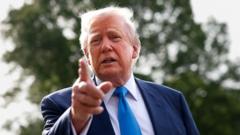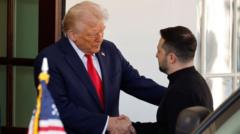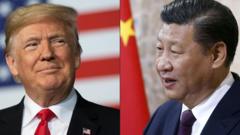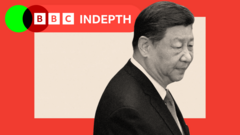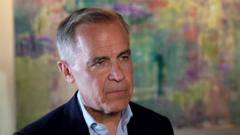The latest developments reflect heightened uncertainty and ongoing sanctions in the dialogue between Tehran and Washington.
**Iran-US Nuclear Negotiations Postponed Amid Rising Tensions**
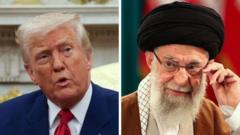
**Iran-US Nuclear Negotiations Postponed Amid Rising Tensions**
A scheduled meeting regarding Iran's nuclear program has been delayed as diplomatic challenges continue.
In a recent development, the anticipated round of discussions between Iran and the United States regarding Tehran's nuclear program has been postponed. The decision was announced to be a mutual agreement, with logistical and technical complications cited as the rationale behind delaying the meeting originally set for this Saturday in Rome. Official responses indicated the scheduling of the talks had not been confirmed from the outset.
Complicating the backdrop of these negotiations, U.S. President Donald Trump issued new threats earlier this week, targeting entities involved in purchasing Iranian oil and petrochemicals. This came in conjunction with a set of fresh sanctions enacted by Washington aimed at companies purportedly linked to Iran. Since withdrawing from a pivotal nuclear agreement with Iran and other major powers in 2018, Trump has consistently asserted his intention to negotiate a more favorable deal.
Initial reports characterized the opening round of talks, which took place in Muscat, Oman, as "constructive." Iran's Foreign Minister Seyed Abbas Araghchi emphasized that Tehran's commitment to finding a negotiated resolution remains strong. Araghchi took to social media platform X to express Iran's resolve in securing a comprehensive agreement that ensures the end of sanctions while upholding the rights of the Iranian people.
On the U.S. side, a State Department spokesperson clarified that the postponement of Saturday's meeting doesn't indicate a breakdown in talks, expressing an expectation for meetings to resume shortly. Oman’s foreign minister stated that a new date would be proposed once an agreement was reached among all parties involved.
Despite the statements suggesting continued dialogue, reports emerging from Tehran hint at growing skepticism regarding the effectiveness of the talks, especially in light of new sanctions and perceived inconsistencies in the U.S. perspective. The recent sanctions are part of Trump's broader strategy of "maximum pressure" aimed at curtailing Iranian influence in the region.
Alongside his firm stance on sanctions, Trump made a pointed statement via his Truth Social account warning that any entity engaging in oil trade with Iran would face immediate repercussions, including secondary sanctions that would prevent them from conducting business in the U.S. This follows a trend of escalating rhetoric from U.S. officials, with Secretary of Defense Pete Hegseth recently asserting that Iran would "pay the consequence" for its support of Houthi rebels.
As both nations navigate the complicated landscape of negotiations, Trump’s administration is focused on containing Iran’s nuclear potential while balancing regional security concerns. Iran, in turn, maintains that its nuclear endeavors are for peaceful purposes and seeks to reach an agreement that would allow for limited enrichment in exchange for relief from sanctions, which have severely impacted its economy.
Complicating the backdrop of these negotiations, U.S. President Donald Trump issued new threats earlier this week, targeting entities involved in purchasing Iranian oil and petrochemicals. This came in conjunction with a set of fresh sanctions enacted by Washington aimed at companies purportedly linked to Iran. Since withdrawing from a pivotal nuclear agreement with Iran and other major powers in 2018, Trump has consistently asserted his intention to negotiate a more favorable deal.
Initial reports characterized the opening round of talks, which took place in Muscat, Oman, as "constructive." Iran's Foreign Minister Seyed Abbas Araghchi emphasized that Tehran's commitment to finding a negotiated resolution remains strong. Araghchi took to social media platform X to express Iran's resolve in securing a comprehensive agreement that ensures the end of sanctions while upholding the rights of the Iranian people.
On the U.S. side, a State Department spokesperson clarified that the postponement of Saturday's meeting doesn't indicate a breakdown in talks, expressing an expectation for meetings to resume shortly. Oman’s foreign minister stated that a new date would be proposed once an agreement was reached among all parties involved.
Despite the statements suggesting continued dialogue, reports emerging from Tehran hint at growing skepticism regarding the effectiveness of the talks, especially in light of new sanctions and perceived inconsistencies in the U.S. perspective. The recent sanctions are part of Trump's broader strategy of "maximum pressure" aimed at curtailing Iranian influence in the region.
Alongside his firm stance on sanctions, Trump made a pointed statement via his Truth Social account warning that any entity engaging in oil trade with Iran would face immediate repercussions, including secondary sanctions that would prevent them from conducting business in the U.S. This follows a trend of escalating rhetoric from U.S. officials, with Secretary of Defense Pete Hegseth recently asserting that Iran would "pay the consequence" for its support of Houthi rebels.
As both nations navigate the complicated landscape of negotiations, Trump’s administration is focused on containing Iran’s nuclear potential while balancing regional security concerns. Iran, in turn, maintains that its nuclear endeavors are for peaceful purposes and seeks to reach an agreement that would allow for limited enrichment in exchange for relief from sanctions, which have severely impacted its economy.

